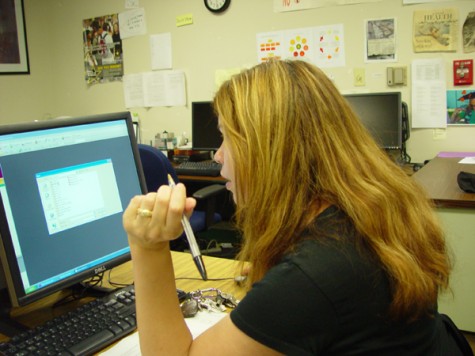Barrak Obama was elected the 44th president of the United States on January 20, 2009, – a day that marked a milestone in the course of history.
Obama is a leader amongst many other significant figures before him, a point noted in “From Slavery to the Presidency: A Tribute to Our Past, Present and Future,” a lecture celebrating Black History Month, on Feb. 24 in Kreider Hall.
The hour-long lecture featured poems and music acknowledging legendary African-Americans throughout U.S. history.
All dressed in dashikis, robe-like dresses from Nigeria, the tune of “America the Beautiful” by Ray Charles, played quietly in the background as the speakers took the stage.
Before the lecture began, counselor Troy Davis, said, “African-Americans have been around for many years so it is difficult to get the whole black history within an hour.” He then reassured the students that it’s “not just about slavery.”
Standing at the podium, Davis discussed the roots of Black History Month can be traced to the early 20th century. He explained how Carter G. Woodsen, an educator and historian, devoted his life to researching artifacts and publications associated with African-Americans.
He published articles and campaigned in hopes for the celebration of a Negro’s History Week in 1925. The celebration was successfully instituted in the second week of February in 1926.
Black History Month is commemorated every February.
Davis highlighted important developments and issues in African-American history from slavery to the present. He focused on the black experience under slavery, the struggle for emancipation and the response to social, political and economic oppression from the collapse of Reconstruction to modern America.
According to Davis, “separate was considered equal [then]. It was impossible to achieve equality in a turbulent atmosphere.”
Following, he explained the rise of Jim Crow, the Harlem renaissance, the civil rights movement, affirmative action, and the election of the first black president of the United States.
Shedding light on black culture growth and history, Davis mentioned renowned leaders such as Martin Luther King Jr, Malcom X, Rosa Parks and Harriet Tubman.
In between Davis’ presentations, CABOT (Computer Application and Business Office Technology) instructor Sandy Sheffey and Garfield career center counselor and CABOT instructor Deborah Kinsley recited a poem entitled “We Wear in the Mask in the Morning,” by Paul Lawrence Dunbar.
Voices intertwined, Sheffey and Kinley recited other poems during the lecture, including “Mother to Son” by Langston Hughes from the Harlem renaissance, “I Know Why the Caged Bird Sings” by Maya Angelou and “I’m Not Giving My Black Back,” a poem written in black dialect by an anonymous author.
“If you really listen to the lyrics and you don’t just poo poo it, there really is a message,” said Sheffey.
And the messages were well received among all. As once stated by Margaret Walker Alexander, “Let a second generation full of courage issue forth; let a people loving freedom come to growth.”
“From Slavery to the Presidency: A Tribute to Our Past, Present and Future” is the first of the Social Science/Humanities lecture series for the spring semester and the next lecture, regarding Women’s History Month will be held tomorrow at 12:30-1:30 p.m. in Kreider Hall.
Psychology department chair Jessica Gillooly was thanked for making this event possible.

